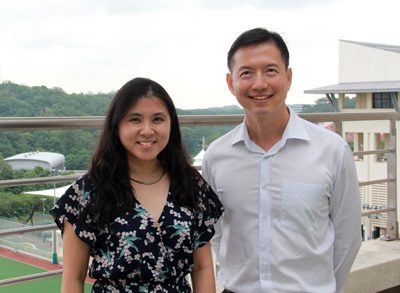Young Children’s Voices in Mathematical Problem Solving
Contributed by Dr Ho Siew Yin and Sng Wei Qin Abbie, from NTUC First Campus, for SingTeach Virtual […]
Read More
The seventh Redesigning Pedagogy International Conference this year focuses on the theme “Education for the Future: Creativity, Innovation, Values”. We speak to the Conference Chairperson and Deputy Chairperson to understand why it is important to prepare our youths today for the future.

Associate Professor Kenneth Poon and Dr Wong Hwei Ming spearheaded the Redesigning Pedagogy International Conference 2017.
Topping the Programme for International Student Assessment (PISA) 2015 rankings, the Singapore education system has been widely recognized as one of the world’s top-performing systems. These rankings are testament to our efforts to deliver high quality education over the years, but it will not do to rest on our laurels. In an era marked by rapid changes, education must evolve to prepare youths today to overcome the challenges that tomorrow may bring.
Education Minister Ng Chee Meng, during his first major speech that sets out his vision for Singapore schools in December 2015, emphasized the importance of creating learning environments where students can become innovators who are able and motivated to create value for society (Teng, 2015).
This emphasis subsequently inspired the theme of the 3-day international education conference held at the National Institute of Education (NIE), Singapore, from 31 May to 2 June 2017.
“The current world, as we now know, has been described as volatile, uncertain, complex and ambiguous (VUCA),” says Conference Chairperson, Associate Professor Kenneth Poon from the Office of Education Research (OER), at NIE. “We can only expect the future world to be increasingly so and very different from today.”
According to a report by McKinsey Global Institute in 2017, about 60 per cent of all occupations today have a 30 per cent chance of being automated, which may affect future employment rates.
“There will be new jobs in the market – jobs that we might have never heard of before,” adds Dr Wong Hwei Ming, Conference Deputy Chairperson also from OER. “Our students therefore also need to develop certain skillsets that are transferable for the future.”
The conference thus sought to prepare learners today for the VUCA world of tomorrow by engaging teacher and researcher participants through various keynotes, symposia, workshops and paper sessions that focused on three elements of education for the future – creativity, innovation and values.
“The current world, as we now know, has been described as volatile, uncertain, complex and ambiguous. We can only expect the future world to be increasingly so and very different from today.”
– Associate Professor Kenneth Poon, RPIC 2017 Conference Chairperson, Office of Education Research, NIE
“The companies today with the largest market capitalization are not those with natural resources,” Director of NIE Professor Tan Oon Seng shared during the conference opening address.
In fact, tech companies such as Apple, Facebook and Alibaba make up those with the largest market value. “We live in the age of tremendous innovation, so education today also has to deal with how we can create a generation that is truly creative,” he added.
It has become more important to nurture creative and innovative students because these factors are critical for their future success. To nurture creativity and innovativeness in students, change has to first begin with our educators, from within the classroom.
To provide teacher participants with a greater insight into fostering creativity in students, Professor Robert Root-Bernstein in his keynote address explained how “thinking inside the box” could potentially benefit students more than the traditional adage of “thinking outside the box” (read more about his keynote address in “Creativity and Being Creative” in this issue).
“Prof Root-Bernstein is an expert in the field of creativity,” Kenneth shares. “I hope that his keynote address will help seed ideas on creativity for us to further explore.”
Kenneth acknowledges that while being creative and innovative are the key ingredients for success, it is also necessary for teachers to teach values because values “ground us in who we are as individuals”.
The rapid technological, socio-economic and structural changes our society is experiencing today bring about ripple effects in individuals’ attitudes and actions.
For instance, the Internet and World Wide Web allow users to receive information almost immediately with just a few clicks of the mouse. Hwei Ming feels that such instant gratification has inadvertently resulted in people becoming less patient.
“The right guiding values can deeply influence our behaviours, attitudes and decision-making.”
– Dr Wong Hwei Ming, RPIC 2017 Conference Deputy Chairperson, Office of Education Research, NIE
“It is therefore important to nurture in our students good moral values such as resilience, honesty and ethics,” says Hwei Ming. “The right guiding values can deeply influence our behaviours, attitudes and decision-making.” In his keynote address, Professor David Carr from The University of Edinburgh, UK, explored the importance of moral character in education (read “Developing Moral Character and Virtue” in this issue).
Values such as commitment, compassion, fairness, helpfulness, honesty, integrity, patience, respect, responsibility, self-reliance and others are important and can be fostered in students.
Hwei Ming emphasizes: “The values we instil in our students today will have a major impact on society tomorrow. These will help prepare students to seize opportunities and face the unknowns of a VUCA world.”
References
McKinsey Global Institute. (2017). Technology, jobs, and the future of work. Retrieved from https://www.mckinsey.com/global-themes/employment-and-growth/technology-jobs-and-the-future-of-work
Teng, A. (2015, December 30). Students need the space to innovate: Ng Chee Meng. The Straits Times. Retrieved from https://www.straitstimes.com/singapore/education/students-need-the-space-to-innovate-ng-chee-meng